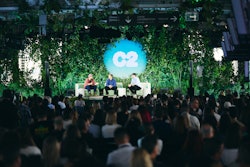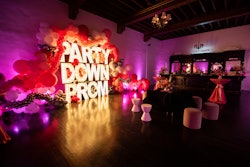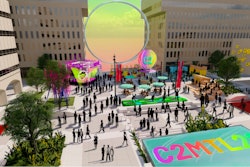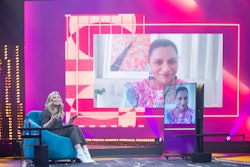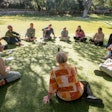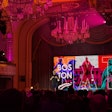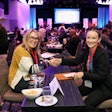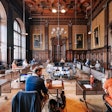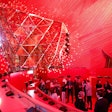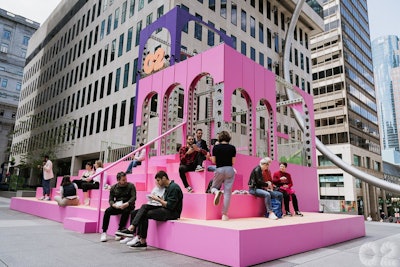
MONTREAL—Guests at this year’s C2 Montréal—which took place May 24-26 at Montreal’s Place Ville Marie and Fairmont The Queen Elizabeth—encountered something unexpected in the middle of their business conference: a fully dressed bride and her wedding planner having a heated argument.
Of course, the 5,000 guests at the creativity-focused conference learned to expect the unexpected, and quickly discovered that the pair were actually actors. The tongue-in-cheek performance was one of several clever stunts and activities that nodded to the conference’s new hotel setting, where the team at experiential business event producer C2 International tried to evoke some of the familiar signs hotel guests might spot.  It's all about "creating spontaneous moments of joy or awe," said C2's Jesse Gainer.Photo: Courtesy of C2MTL
It's all about "creating spontaneous moments of joy or awe," said C2's Jesse Gainer.Photo: Courtesy of C2MTL
The theme for the 12th edition of C2MTL was “combined perspectives,” which Johan Vakidis, C2’s chief creative officer, said was “baked into the whole experience, including the format and content.” And part of that was finding fun ways to work with and embrace the venue, which wasn’t the typical black-box space in which most previous editions of the conference have been held.
“A hotel by default is very purposely designed for a certain mood and vibe,” pointed out Vakidis. “We even played a bit on the fact that hotels usually have repetitive patterns and carpets, and we applied some of that to the chairs and other things we brought in—in addition to the staged acts that mimicked some of the craziest things you might find at a hotel.”  Blending theatrical performances with unique brainstorming sessions has long been a cornerstone of C2MTL, which was born from a partnership with Cirque du Soleil.Photo: C2MTL
Blending theatrical performances with unique brainstorming sessions has long been a cornerstone of C2MTL, which was born from a partnership with Cirque du Soleil.Photo: C2MTL
Leaning into artist performances comes naturally to the team at C2; after all, the business conference was born from a partnership with Cirque du Soleil and has become known for its immersive, interactive, and theatrical lab experiences; networking opportunities; and unique programming. Jesse Gainer, C2’s vice president of growth and partnerships, described it all as “spontaneous moments of joy or awe.”
Gainer continued, “One of the things that C2 is well known for is our labs, which use experience design and environment design to create these great atypical brainstorming moments. So we had to reimagine what that would be in this space.” Part of that reimagining came from working with local Montreal artists, giving them subject matter and a theme and letting them drive the experience. “And so what we got were lab experiences that felt a bit wild or untamed, but still cohesive to the story,” he said.  In the AI.PM2027 lab experience, 10 participants worked to program the emotions and strategic vision of a prime minister who was created by AI.Photo: Courtesy of C2MTL
In the AI.PM2027 lab experience, 10 participants worked to program the emotions and strategic vision of a prime minister who was created by AI.Photo: Courtesy of C2MTL
One memorable and timely lab experience was called AI.PM2027. The idea was to imagine that, in 2027, Canada will elect an AI prime minister. “It was a collaboration of actually using AI, but then combining it with tangible touchpoints of the political campaign process,” explained Gainer. “There was a mechanic where you physically input the emotions of this prime minister, and the exercise provided real-world outcomes of what would happen if this is how you trained that AI.”
 “The users need to know that they’re talking to a machine or a human. Accounts on social media and so on need to be regulated so we know who’s behind the account—and it has to be human beings most of the time,” said Bengio (pictured) during the conference.Photo: Courtesy of C2MTL
“The users need to know that they’re talking to a machine or a human. Accounts on social media and so on need to be regulated so we know who’s behind the account—and it has to be human beings most of the time,” said Bengio (pictured) during the conference.Photo: Courtesy of C2MTL Sustainability was also a big focus this year, both in the content and in the event’s design and format. The content stage, for example, had a giant robot structure. In addition to nodding to fears of the future of AI, the robot was designed by local Montreal artists and built from recycled air ducts.Photo: Courtesy of C2MTL
Sustainability was also a big focus this year, both in the content and in the event’s design and format. The content stage, for example, had a giant robot structure. In addition to nodding to fears of the future of AI, the robot was designed by local Montreal artists and built from recycled air ducts.Photo: Courtesy of C2MTL
The “combining perspectives” theme tied into the content, too, which drew additional speakers like skateboarder Tony Hawk and ALDO Group CEO David Bensadoun. “We had a ‘pleasure and purpose’ talk, where a sex tech CEO and a pastry chef talked about pleasure as a gateway to deeper meaning, community, and business,” added Vakidis. “This combination of seemingly different things, lining up on one commonality, was the recipe for everything.”  Networking is a huge component of C2 Montréal. In addition to hosting a curated program for professionals specifically from the event world, the conference's popular braindate concept returned. “Such a cornerstone of our event is connectivity, and creating this great context for conversations and meaningful connections,” said Gainer. “And braindates are a really great way of facilitating that, because it takes that idea of a serendipitous meeting and provides purpose to it. It’s a conversation about a topic; it’s saying, ‘I have a challenge or I’m an expert on something, so let’s connect over that.'”Photo: Courtesy of C2MTL
Networking is a huge component of C2 Montréal. In addition to hosting a curated program for professionals specifically from the event world, the conference's popular braindate concept returned. “Such a cornerstone of our event is connectivity, and creating this great context for conversations and meaningful connections,” said Gainer. “And braindates are a really great way of facilitating that, because it takes that idea of a serendipitous meeting and provides purpose to it. It’s a conversation about a topic; it’s saying, ‘I have a challenge or I’m an expert on something, so let’s connect over that.'”Photo: Courtesy of C2MTL
While the event was technically hybrid again this year—with several content sessions viewable via livestream or on-demand—the team really focused their efforts on the physical, in-person element. “There are certain types of meetings that can happen very well digitally, and be super-immersive in their own way,” acknowledged Vakidis. “But, for me, I felt a vibe from the [in-person] audience this year—there was a readiness that felt different from last year. There was a hunger. That’s something that will come into consideration on how we design a participant journey in the future.”
To Gainer, hosting and attending an in-person meeting is more of a premium than it’s ever been. “It’s more expensive to travel, and companies are a bit more stringent about sending people to events,” he noted. “It’s incumbent on us to really think about how we’re hosting people, and make sure the experience feels personalized and authentic—that if you’re going to come and spend that much money, we connect with you and really understand our audience.”  “Connectivity is such a cornerstone of our event,” said Gainer. “It’s about creating great context for conversations, and making sure meaningful connections happen.”Photo: Courtesy of C2MTL
“Connectivity is such a cornerstone of our event,” said Gainer. “It’s about creating great context for conversations, and making sure meaningful connections happen.”Photo: Courtesy of C2MTL




